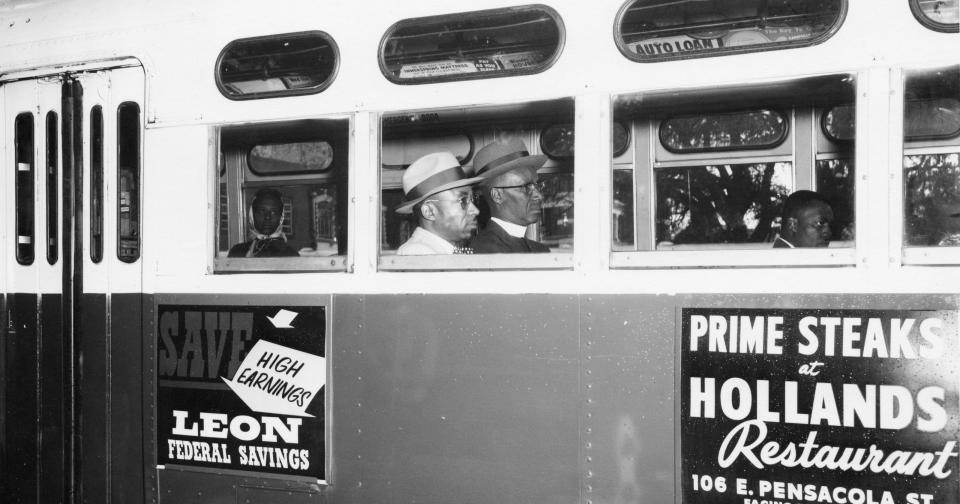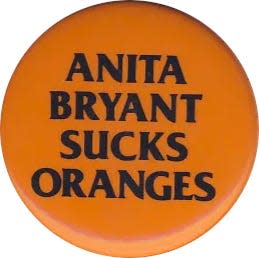Before Target, there was Anita Bryant's orange juice: 3 famous boycotts in Florida history
- Oops!Something went wrong.Please try again later.
It has never been easier to announce, promote, or join a boycott in history.
Thanks to the nearly instantaneous communication and viral possibilities of social media, along with news-hungry media ready to help spread the word and politicians jumping on a bandwagon to galvanize their base, the hardest part of any boycott — getting anyone to notice that you're boycotting something, and why — can now happen with a few well-chosen words, a video shot on your phone, or a funny meme. Especially a funny meme.
But do boycotts work?
Ask Target. A concentrated effort by prominent conservatives and activists resulted this week in the company announcing changes in its Pride Month strategies. Or Anheuser Busch, whose marketing plan to include trans TikTok star Dylan Mulvaney in a promotion for its beer rallied conservatives against it and ended up giving us a new word: "budlighting,"
'BudLighted': Target is latest to face boycott calls over support for the LGBTQ+ community
'Tuck friendly' swimsuits, Pride merch: Target is pulling some LGBTQ items after threats
Traditionally boycotting has rarely affected a company's bottom line for very long. Most are too vague or target companies that are either easy to avoid or too necessary to drop. Sometimes, as in the case of LGBTQ boycotts of a popular company, a backlash can result in a "buycott" of support instead (see: Chick-fil-A). Boycotts that work are either from marginalized groups drawing attention to their plight, or when a company's reputation is damaged.
Here are some of the top boycotts in Florida's history.
The Tallahassee Bus Boycott
Five months after Rosa Parks famously refused to surrender her seat on a racially segregated Montgomery, Alabama bus to a white person, triggering a citywide boycott that helped bring national attention to the ongoing civil rights movement, two Florida A&M students made their own stand.
On May 26, 1956, Wilhelmina Jakes and Carrie Patterson boarded a bus and sat in the only two open seats, which were next to a white woman. When told they'd have to get off the bus, Jakes agreed if her fare was refunded. Instead, the bus driver pulled over and called the Tallahassee police, who arrested both women for "placing themselves in a position to incite a riot." The next night the local Ku Klux Klan burned a cross in the yard of the home near campus where the women rented rooms.
Within days, FAMU students organized and agreed to boycott city buses and several dozen Black pastors and businessmen met to support the movement. For seven months, Black residents — the bus company’s main customers — refused to ride city buses. The boycott attracted national attention and led to the arrest of 26 people and two temporary shutdowns of the bus company, ultimately without ending bus seat segregation in the city. But it kickstarted Tallahassee's civil rights movement.

Tallahassee Bus Boycott: The ride to equality started 60 years ago
'History is knowledge': Tallahassee bus boycott marks 64 years
“It is impossible to overestimate the significance of the bus boycott in Tallahassee civil rights history,” said Glenda Rabby, author of “The Pain And The Promise,” the seminal book about the Tallahassee civil rights movement. “It was the first organized protest and successful challenge to racial segregation and discrimination in the city. The boycott helped to sow the seeds of discontent that would eventually flourish in a protest movement against the very foundation of southern society: the unjust laws and customs designed to perpetuate and enforce racial inequality.”
Anita Bryant's 'Save Our Children' campaign
When the gay rights movement sprang into national awareness after the Stonewall riots in 1969, the first organized voices against it came from Florida. Anita Bryant, singer, former Miss Oklahoma and the face of Florida orange juice on TV, began speaking out against a 1977 Dade County ordinance that outlawed discrimination in employment, housing and public services on the basis of sexual orientation.
Conservative and religious leaders formed the "Save Our Children" campaign to raise awareness of the ordinance and made Bryant the president and its public face. She appeared in commercials and full-page newspaper ads and became a frequent guest on talk shows and religious programs, receiving nearly daily updates in the news. "As a mother," she told audiences, "I know that homosexuals cannot biologically reproduce children; therefore, they must recruit our children.” The ordinance was overwhelmingly repealed and later efforts to outlaw discrimination against LGBTQ people in Florida and the U.S. were rejected.
Florida history: Historians draw parallels between 'Don't Say Gay' legislation and purge of gay teachers decades ago

In return, gay activists and allies began boycotting Florida orange juice, with support from iconic gay activist Harvey Milk. During the "gaycott," protesters poured out gallons of orange juice in the streets. Gay bars stopped buying Florida orange juice and bartenders served the "Anita Bryant," a screwdriver made with apple juice instead of orange juice. Buttons and shirts and hats were sold nationwide. Anita Bryant and Florida orange juice also became the face of LGBTQ activism.
The Florida Citrus Commission supported Bryant throughout but Art Darling, the company's publicity director, told the Associated Press, "The whole Anita thing is a mess. No matter what we decide, we're only going to lose. I wish she would just resign." Ultimately the commission canceled Bryant's 10-year contract.
Florida Citrus Hall of Fame: Anita Bryant cancels after threatened protest
The boycott campaign didn't succeed in stopping "Save Our Children" but just as Bryant's campaign helped galvanize conservative and religious groups into organized action, it helped local LGBTQ leaders and groups organize national efforts that continue to this day.
Boycott the Bell
On April 1, 2001, the Coalition of Immokalee Workers (CIW) organized the first farm worker boycott of a fast food corporation.
Workers in Immokalee and South Florida received 40 cents for every 32-pound bucket of tomatoes picked at the time, according to U.S. Department of Labor data, meaning they'd need to pick two tons to make $50 a day, with no overtime, no health insurance, no sick leave, holidays or paid vacation and no pension. The group, mostly Latino, Mayan and Haitian immigrants, attempted strikes but were unsuccessful. So they called for a boycott of Taco Bell.
Between 2001 and 2005 it became a national movement. Protests were held at local Taco Bells in Gainesville. The company was flooded with letters and postcards. Actor Danny Glover met with the group in Miami at a labor rights forum. When Taco Bell bought space in San Francisco Giants Stadium during the 2002 World Series, protestors put a banner nearby reading, "Taco Bell Exploits Farmworkers" with a link to the protest site, which was broadcast worldwide. Across the country, students at twenty-five colleges and high schools organized to remove or block Taco Bell restaurants with a "Boot the Bell" campaign.
in March 2005, Taco Bell's parent company, Yum! Brands, capitulated and agreed to pay a penny more a pound for tomatoes from Florida growers, nearly doubling the workers' wages, and instituted a conduct code to ensure "more humane labor standards."
Similar attempts against Burger King and Wendy's didn't see the same level of success but ultimately McDonald's, Burger King, Subway, Walmart, Trader Joe's, Taco Bell, Chipotle and seven other major companies signed on to the CIW's Fair Food program, a partnership launched in 2011 among farmworkers, Florida tomato growers and food retailers that agreed to pay the extra penny and buy only from suppliers meeting a code of conduct.
C. A. Bridges is a Digital Producer for the USA TODAY Network, working with multiple newsrooms across Florida. Local journalists work hard to keep you informed about the things you care about, and you can support them by subscribing to your local news organization. Read more articles by Chris here and follow him on Twitter at @cabridges
This article originally appeared on The Daytona Beach News-Journal: Florida's biggest boycotts: Anita Bryant, Tallahassee Bus Boycott, Taco Bell

